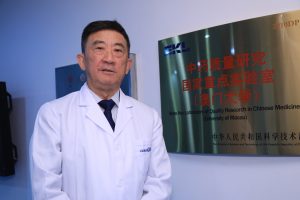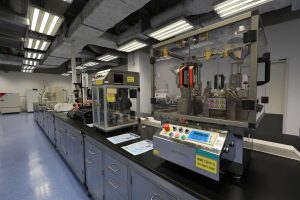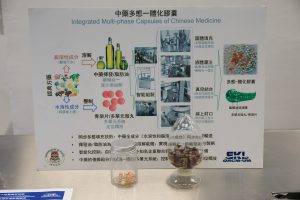On 18 February 2019, the Chinese government released The Outline of the Strategies for the Development of the Guangdong-Hong Kong- Macao Greater Bay Area (the Outline). Some of the strategies mentioned in the document concern traditional Chinese medicine. For instance, establishing a high-quality platform for technology and innovation, providing support for the construction of a Traditional Chinese Medicine Science and Technology Industrial Park (the Industrial Park) and other major projects to facilitate innovation in Hengqin, and providing support for the establishment of a platform to promote the development of the Chinese medicine science and technology industry in Macao. Several months before the release of the Outline, President Xi Jinping inspected the Industrial Park, demonstrating the government’s commitment to promoting the development of Chinese medicine.
The University of Macau’s (UM) Institute of Chinese Medical Sciences (ICMS) and State Key Laboratory of Quality Research in Chinese Medicine (the Lab) have established a platform for the commercialisation of new technologies in Chinese medicine, in collaboration with Peking University’s State Key Laboratory of Natural and Biomimetic Drugs and the Industrial Park in Hengqin. Prof Wang Yitao, director of both the ICMS and the Lab, says that establishing a presence in the Industrial Park is only one step the institute is taking to explore an innovationdriven path that aims to answer the nation’s needs by tapping into Macao’s advantages. With the progress the institute has already made, integration with the Greater Bay Area will provide greater scope for personnel training and research development.
Establishing a New Platform for Chinese Medicine
Founded in 2002, the ICMS hopes to establish a world-class platform for the study of Chinese medicine quality systems and the development of innovative Chinese medicines. Over the years, the institute has produced many Chinese medicine professionals and encouraging research results. In 2008, a group of Chinese medicine scholars in Macao, led by Prof Wang, applied to the Ministry of Science and Technology to establish a state key laboratory of quality research in Chinese medicine. In December 2010, the application was approved, leading to the establishment of China’s first state key lab in the field of Chinese medicine. Since its founding, the Lab has received visits from various state leaders, including President Xi, former State Council Premier Wen Jiabao, and former Vice President Zeng Qinghong. In 2014, President Xi visited UM. Upon learning of the multi-phase capsule developed by the lab, the first of its kind in the world, President Xi encouraged the lab to participate in China’s innovation-driven growth strategy and make a more substantial contribution to Chinese medicine.
Prof Wang says, ‘Chinese medicine is a gem of the Chinese civilisation, and it has received considerable attention worldwide. Ever since its founding, the lab has received a lot of support from the central and Macao SAR governments. In fact, the central government accords a very important status to the lab, so much so that establishing a platform for promoting the development of the Chinese medicine science and technology industry in Macao has been written into the Outline. This means we will have greater scope for further development in scientific research, personnel training, and commercialisation of research results.’ In 2018, the Guangzhou University of Chinese Medicine, Hong Kong Baptist University, and UM jointly established a centre for innovations in Chinese medicine in the Greater Bay Area. The centre mainly focuses on the development of innovative Chinese medicines and the study of international quality standards for Chinese medicine. Prof Wang explains: ‘The Greater Bay Area has great potential and provides an environment that is conducive to innovation. We want to join hands with other universities in the Greater Bay Area so we can combine our strengths and make greater contributions to the development of the Chinese medicine science and technology industry in the Greater Bay Area.’
Widespread Recognition
Prof Wang is an eminent expert on Chinese medicine. His main research interest involves Chinese medicine quality system evaluation. As a researcher, he is innovative and rigorous. As an educator, he believes in tailoring his teaching methods to student aptitude. Under his leadership, the faculty members and postgraduate students in the institute have won numerous honours and widespread recognition from their peers both at home and abroad. A research project on using DNA barcoding for identifying the species of medicinal plants, jointly conducted by Prof Wang’s team and researchers at Peking Union Medical College and other institutions, received a second prize of the State Scientific and Technological Progress Award in 2016, a Medal of Merit-Education from the Macao SAR government in 2011, and a special award at the Macao Science and Technology Awards in 2018.
Two programmes offered by the institute, in the areas of Clinical Medicine, and Pharmacology & Toxicology, respectively, as well as three other programmes offered by UM, in Engineering, Computer Science, and Social Sciences, General, are ranked among the top 1% in Essential Sciences Indicators (ESI) rankings. According to Prof Wang, there are currently five research centres under the institute, which are dedicated to studying the effectiveness, safety, stability, controllability, and clinical applications of Chinese medicines. With the support of the Macao SAR government, the target screening centre and pharmaceutical engineering centre became operational earlier this year. ‘The centres are equipped with state-of-the-art devices, which are used in the separation and analysis of the ingredients of Chinese medicines; structure identification; studies of metabolomics, proteomics, pharmacological activity, and mechanism of action; development of new forms of drugs and new techniques; and quality evaluation. ‘We hope to create world-class conditions to support the state key lab in its scientific research, commercialisation of research results, and product development,’ says Prof Wang.
Nurturing Innovative Professionals
Prof Wang adopts a meticulous approach to education. Soon after he joined the ICMS, he identified the mission of the institute: combining traditional Chinese medicine with advanced theories and methodologies in biomedical sciences to produce innovative, interdisciplinary Chinese medicine professionals with an international perspective. He believes there is an urgent need for such Chinese medicine professionals in Macao and China in order to promote the development of the Chinese medicine and the biomedical technology industry. In 2002, the institute launched Macao’s first master’s degree programmes in Chinese medical sciences and medicinal administration. A doctoral programme and a bachelor’s degree programme in biomedical sciences were launched in 2004 and 2011 respectively, with the latter being included in the curriculum of the Faculty of Health Sciences in 2015.
Over the years, the ICMS has produced more than 500 graduates, many of whom are now key players or work in senior management positions in medicine, health, and other related industries in Macao. Those who graduated from PhD programmes and chose to pursue further education were accepted by world-renowned universities such as Harvard University, Yale University, the University of Chicago, the University of Cambridge, and Leiden University. After graduating from these universities, some became professors or were appointed to other senior academic positions at renowned universities in China such as Peking University, Tsinghua University, Zhejiang University, and UM play a key role in promoting the innovation and internationalisation of Chinese medicine in Macao and mainland China, while others were hired as senior management or research scientists at pharmaceutical companies ranked among the top 500 in the world.
Prof Wang is very excited about the achievements of the alumni. He says, ‘In terms of academic programmes offered by our institute, it’s worth mentioning a few things. First, we are innovative and meet international standards in our curriculum design. Second, English is our teaching language. Third, we are engaged in innovative, interdisciplinary research and launch joint programmes with renowned universities in the world. These three characteristics have made our institute the focus of attention in the international community.’
Promoting Chinese Medicine in the Greater Bay Area
On 6 March 2011, with state leaders as witnesses, the governments of Guangdong province and the Macao SAR signed a framework collaboration agreement, signalling the official start of close cooperation between Guangdong and Macao. On 19 April of the same year, a groundbreaking ceremony was held for the Industrial Park, the first collaborative project between Guangdong and Macao. In 2010, the institute began to fully participate in the preparation and construction of the Industrial Park in Hengqin by providing support for the development and registration of new products, quality evaluation, pilot-scale production, personnel training, and the establishment of a centre for innovations in Chinese medicine, a joint project between UM and Peking University. In 2018, on the first leg of his tour of Guangdong province in celebration of the 40th anniversary of China’s reform and opening-up policy, President Xi visited the Industrial Park in Hengqin, where he made a special stop at the centre for innovations in Chinese medicine and talked to several alumni of the ICMS.
Over the past decade, the ICMS has completed four major collaborative projects, namely planning for the Chinese medicine science and technology industry in Guangdong and Macao, the feasibility study for the Industrial Park, the establishment of a big data platform for Chinese medicine, and the development of an innovative research team. The institute provides support in international training, quality control, the development of new forms of medicine, the establishment of a big data platform, and the construction of other software and hardware facilities, in order to support the Chinese medicine science and technology industry in Macao and Guangdong, and to promote economic diversification in Macao. It also collaborates with the Industrial Park to nurture Chinese medicine professionals for countries and regions covered by the Belt and Road Initiative as well as Portuguese-speaking countries.
With Macao’s booming economy and the rapid development of the Greater Bay Area, the need for Chinese medicine professionals in Macao has never been greater. This brings new opportunities for the institute. Prof Wang says that the institute will continue to nurture the high-calibre professionals who are urgently needed by China and Macao, to follow the innovation-driven growth strategy, to prioritise the development of quality standards, to develop innovative Chinese medicine products, and to establish a platform to promote the development of the Chinese medicine science and technology industry in Macao as well as the internationalisation of Chinese medicine.
Source: UMagazine Issue 20



